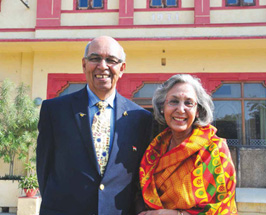
No job is too small, no responsibility too insignificant for Admiral (Retd) Madhvendra Singh, former Chief of Naval Staff, Indian Navy, and now entrepreneur as well as a ‘friend, philosopher and guide’ to guests at his heritage hotel in Jaipur, Rajasthan. He believes in operating through well oiled systems, be it managing an entire naval force under his command, or a group of guests looking for rest and relaxation-a sentiment that is fully endorsed and supported by his wife, Kaumudi Kumari
Admiral (Retd) Madhvendra Singh was Chief of Naval Staff of the Indian Navy from 29th December 2001 until his retirement from service on 31st July 2004, at the close of 41 years of service. He was also the Chairman of the Chiefs of Staff Committee from 2002 to 2004. He won several awards early in his naval career and chose to specialise in Gunnery. He subsequently attended courses at Defence Services Staff College, Wellington, Tamil Nadu and the National Defence College in New Delhi, as well as abroad at institutions such as the Royal Military College of Science at Shrivenham, United Kingdom and the Naval War College at Newport, USA. Apart from his numerous staff appointments, Singh commanded INS Viraat, INS Ranvir and INS Talwar, which are an aircraft carrier, a guided missile destroyer and a guided-missile frigate, respectively. He also commanded the Naval Academy at Kochi.
Active service operations in which Singh was involved include the 1961 actions in Goa, and in both the 1965 and 1971 Indo-Pakistan wars. His later operations included the 1987 Operation Pawan in Sri Lanka and acting as commander of the Western Maritime Theatre during the Kargil War of 1999 and as the Chief of Naval Staff (CNS) during Operation Parakram.
“In the Navy you have a very disciplined staff, so whatever you say gets done; in the civil street whatever you say may not get done and therefore you have to be on your feet more often, to ensure things get done”
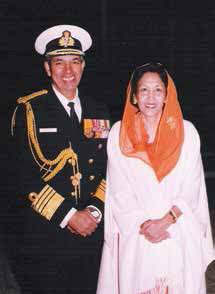
Singh has been awarded both the Param Vishist Seva Medal and the Ati Vishist Seva Medal for his distinguished service. Ever since his retirement in 2004, he has taken up the role of an entrepreneur in the hospitality industry. Having turned his ancestral heritage house into the Devi Niketan Heritage Hotel in Jaipur, he has reversed his role from being served by his staff when he was at the helm of the Indian Navy, to serving his guests in his 14 room hotel with a smile, concern, humility and with great enthusiasm.
It is pertinent to begin this interview with a few reviews on the Trip Advisor website, where guests narrate their experience at Admiral (Retd) Madhvendra Singh’s popular heritage hotel in Jaipur, Devi Niketan. It reflects the intense personal interest taken by the former Chief of Naval Staff in making his guests feel comfortable staying at his hotel, making it feel much like a second home.
“About 30 minutes after we landed in the morning we got a call from the Admiral welcoming us to Jaipur. Once we got there the hotel staff and the Admiral were so helpful. Admiral Singh sat down with us and helped us plan the next few days. I was unfortunately a bit sick and the staff was very helpful to get some medication from a store nearby. I felt safe and relaxed as I mainly rested in the evenings. The rooms are extremely spacious and very clean while the staff are always on call. On the last day the Admiral surprised me and put up a Canada flag in the breakfast area. It made me miss home but at the same time I was so pleased that a Canadian flag was present and made me feel very special. I would highly recommend this place for any domestic or international traveller given the excellent service and amazing location.”
“This has been my 4th time stay at Devi Niketan with a high school group from the United States and it would be difficult to find a more welcoming place anywhere. From the moment we arrived, the staff and especially the Admiral were very attentive to our needs and it served as a great place for rest and relaxation on an otherwise very hectic travel schedule. Thank you for a great stay and I look forward to staying with you again.”
“Run by the ex Chief of Indian Navy, this place is managed like a warship, offering the best in hospitality, comfort, relaxed atmosphere, all served with the most enthusiastic and generous host possible, the Admiral himself. Feels like home since it is a home, staff are home trained and treat guests as family members. The garden in the front and back and the poolside chairs offer relaxing atmosphere in the sun on a winter day. It couldn’t be better located to any part of the city. This is my place of choice every time I visit Jaipur.”
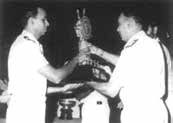
Admiral (Retd) Madhvendra Singh: Everybody has various roles to play in life. When you are a child, you have the role of a sibling; or a child of your parents. After I got married, I have a role as a husband, and so on. When I was serving in the Indian Navy, I had the role of the Chief of Naval Staff. Now, I am no longer the Chief of Naval Staff, so that role no longer exists and is forgotten, though all that I learnt in the Navy is not forgotten. Now I have a new role as the owner and manager of a hotel. Hence, it was an easy transition as far as I am concerned. I have always kept my feet on the ground and therefore I didn’t find it difficult to change over to the new role. The days have gone when everyone said ‘Sir’ to me; now I say ‘Sir’ to my guests.
Kaumudi Kumari Singh: See, you have to accept that once you are not in that position, you are just not there. So, you have to do something new. I think, both of us have been able to keep our feet on the ground and not let the position or the perks in the Navy go to our heads. Initially, we did miss the perks of the Navy, but when you don’t have it, you don’t have it. That’s it. Admiral (Retd) Singh: Fortunately, thanks to my parents I inherited this property so I was able to run a hotel. Therefore, we did not have to adapt to many lifestyle changes. We continued the same sort of lifestyle except that we missed the Navy.
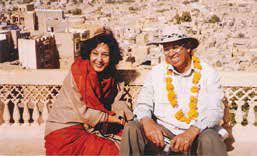
There is definitely a difference—after all in the Navy you have a very disciplined staff, so whatever you say gets done; in the civil street whatever you say may not get done and therefore you have to be on your feet more often, to ensure things get done. I have trained my hotel staff, but you know the old story—when the cat is away, the mice are at play. So, even Kumu takes the rounds of the hotel and she sees things with a different eye. So, while management is about trusting people, monitoring is essential and both of us do it with a different eye and focus that complement each other.
“I am totally against the concept of total retirement wherein you do nothing. You’ve got to keep yourself occupied even after you retire. If you do nothing, you grow old”
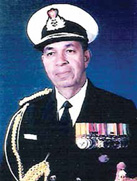
I am totally against the concept of total retirement wherein you do nothing immediately after retirement. You’ve got to keep yourself occupied even after you retire. If you do nothing, you grow old. I saw that in my father. So long as he was working, he was a young man; within two years of just sitting at home, after retirement, he grew old. So I think both men and women need some occupation as long as they are fit. Another reason was, being in command appointments for many years in the later part of my service, I was certainly not going to work for somebody else. I had to be my own boss even if it was a small jhopdi. Also, I was fortunate to inherit this property, but to be honest, I couldn’t maintain it on my pension, so the property had to earn a little bit on its own. Another reason I joined the Navy is to see the world; now the world is coming to me. That is another reason—when you are retired, you need to meet people. I like to meet people and it is very interesting and educative talking to guests from all parts of the world. By the way, hospitality is something which comes naturally to naval officers and to a Rajasthani. By and large we like to be good hosts. I think any officer from the Armed Forces will fit in very well into the hospitality industry, where he is his own boss. The other big advantage of being your own boss is that you run it at your own pace. At this age I don’t want to be too busy. Any hotelier will tell you that 65 to 80 per cent occupancy is required for being profitable. By keeping running costs low, I break even at 25%; if I have 30-35% I am contented and very happy. The other reason is, I don’t want very high occupancy all the time, as it gives me no time to attend to the guests. If the whole place is full, how will I talk to you.
I took the opportunity of my daughter’s marriage to get it renovated, so that it could fit the bill of a hotel. While the basic structure remained the same, I modernised all the bathrooms and reorganised the rooms as this house was built as a joint family accommodation. Each bedroom was huge and like a suite, with dressing room and storerooms. I kept the rooms large enough, but in the centre of the building I left lot of open area, so people can relax and enjoy themselves. I could have added a few more rooms but I didn’t, in order to give space to my guests. And of course, I fitted all the necessary systems—telecommunications, television, air conditioning. This took about ten months to complete.
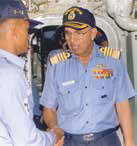
When I decided to start this hotel, everybody said, get a manager. So I said look, if I have to learn the job, I must manage it myself to begin with. The moment you get a manager, you learn nothing and also I would have to keep an eye on him. The more the employees you have, the more supervision you have to do. So, I said I will continue as a manager. Then, somebody asked me what else I did. I said, I do whatever is necessary. Once, I also stood in for the cook—what is there in making omelettes? Then, my Navy friend said, are you also the cleaning man? I said, yes, I teach them how to do cleanship. You see, unfortunately we have this caste consciousness—when the workers come, they refuse to clean the toilets. I explained to them that in the Navy we have no caste or religion—we are Indian. On-board the submarine, everybody cleans the toilet. I make them put on their gloves and teach them to clean it. You have heard the term, ‘shipshape’ that comes from the Navy. There is no difference between running a ship and running a hotel, except marketing. Otherwise, just as you keep your ship clean and look after the troops, you keep the hotel clean and shipshape and look after the troops—my employees and my guests. Just as there are different systems in the ship like the electrical system, air-conditioning system, water system, Wi-Fi system etc, you have different systems in the hotel—they have to be well maintained, including the sewage system. Naval officers are never shy of working with their hands, because the Navy teaches you dignity of labour. So, every three months my staff opens all the sewage manholes and I have them cleaned, that is why you will never find a single cockroach here. You may find cockroaches in five star hotels but not in my hotel, because they all come from the sewage line which is cleaned and disinfected every three months.
“Unfortunately for a variety of reasons, which I will not go into here, the politicians and the bureaucracy have tried to bring down the armed forces and that message goes down the line”
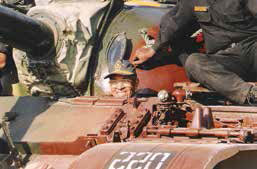
I made a website and then people started coming over. In the first two years, it did very well—in fact, we made good profit. Thereafter, we depend on our guests to pass the word around. Then of course, tourism died after 2010 because foreign tourists were not coming and there was a lot of competition due to many new hotels coming up. And like I said, I am content and happy with the number of guests we are getting, so I do not have to do any aggressive marketing.
My wife does the two most difficult things—one is the laundry and the other is the kitchen. Groceries are bought by the staff.
By and large, my philosophy is to give my guests more than they expect, so they don’t complain. People come from all over the world, besides other parts of India—and Indian guests are not bad at all. Guests don’t know Jaipur. So, I also play the role of a tourist guide in Jaipur. My wife says I am the best guide because I am so proud of our city and I take that compliment seriously. I also help out if my guest needs something, like a doctor’s help. So basically all guests want to be taken care of. I have never had problems with any guest so far, except for one, about eight years back, over a silly thing. He complained of mosquitoes in his room. I said, “Sir, you left the door open, I told you not to do so, particularly during evening hours.” So, he was very unhappy about mosquitoes and said he is checking out. I said, “By all means Sir, check out—it is your privilege.” He asked for the bill and I said, “You are unhappy, I don’t charge you”. He felt sheepish as he walked out.
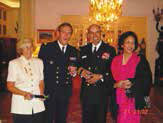
Definitely, I knew that I wanted to join the armed forces because of the military tradition in the family. Actually, at the age of 11, I did appear for the entrance test of the Rashtriya Indian Military College (RIMC). Our Sainik Schools are modelled on the RIMC. I got through, but my father said no, you are too young. Later, he even offered to send me to the USA to become an engineer or a doctor—those were the only two preferred professions at that time—but I insisted on joining the National Defence Academy (NDA).
Firstly, our family didn’t have a luxurious life style. We were all brought up as middle class people in an army environment. Besides, I was in boarding schools at Mayo College, Welham Boys School, Dehradun and St Xaviers Jaipur. So, one was quite prepared for a tough life in NDA.
Basically, NDA training is rigorous and the fact is that they try and toughen you mentally and physically through academic and physical training. You then realise that you are capable of much more than you think, and that is the aim of NDA training—to make you realise your full potential and to strive for excellence.
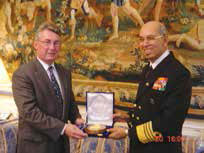
When I had joined the NDA, my father was in the army and at that point of time, along with him were 23 relatives who were serving either in the army or about to join. So, I felt that I must do something different. Also, since my father was already a General then, had I opted for the army and done well, everybody would have said, “Yeh to general ka beta hain”, he has to do well. So, I didn’t want to live under my father’s shadow, therefore, I didn’t join the army. That left me with the option of the Navy or the Air Force. I was hesitant to put my life in the hands of a flying machine that I didn’t understand. I felt unsafe, quite wrongly, but that was the impression in my young mind, so frankly I cannot say that I joined the navy because I loved the sea or had salt in my veins. I selected the Navy by a process of elimination.
There are various specialisations in the Indian Navy like a torpedo specialist or a navigator. Those who man the guns belong to the Gunnery Branch. And we gunners are very proud of the fact that our role is crucial—we believe the whole Navy exists to ensure that the gun reaches the right place at the right time. If your ship is not at the right place at the right time to fire those guns, then you need not be there. Guns are required for sea to sink ships and destroy aircraft and on land to support the Army. Everyone in the Navy, though, jokes about us.
Because we talk very loudly—my wife too complains about the same. There is so much noise in the gun turret that you need to speak loudly, to be heard. So, they keep joking that all gunners are deaf, but that they are conveniently deaf—when they want to hear they can hear some conversation, they do.
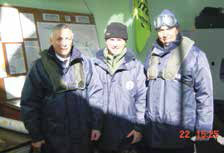
In the 1965 war, I was on a ship in the Nicobar Islands taking cadets for deployment to Malaysia. Suddenly, that evening, war broke out. So, we thought we would be recalled, but we got no orders so we continued on our course. When we could see the shore of Malaysia we were ordered to return to Nicobar and thereafter we were patrolling the Andaman & Nicobar Islands. In the 1971 war, again my ship was being refitted, but it was not ready, so we were told to carry out duties in the war room. If you are not on board a ship the best place to be in war is a war room. Because you are directing the war, you are aware of everything that is happening. For example, on the night of 3rd December there was a lot of tension in the war room because we all knew that an attack on Karachi was going on but there was no news because there was radio silence. If ships break radio silence, the enemy immediately knows their position and can take counter-measures. Finally at about 11:30 pm or thereabouts the code signal came, ‘ANGAR’ which meant, ‘mission accomplished’. The Karachi attack was completed successfully. So that was where I was in 1971.
They are as loyal and passionate about the Navy as we were. Our training ensures that these qualities are developed and are ingrained into our officers. And that is why even today, the casualty rate of officers vis-à-vis the jawans is much higher in the Indian Armed Forces than other Armed Forces because our officers lead from the front.
Where the Armed Forces score is in our training methods. I am sure you are aware of the fact that it is not the best youngsters who opt for a career in the Armed Forces—that is the universal trend in all democracies. In all democracies, by and large, most youngsters do not prefer to go into the Armed Forces. In all dictatorships, yes they do, for a number of reasons. I will not go into that. So, where we score in the Armed Forces is that we take the average guy and, over a period of time, convert a civilian gentleman into a highly motivated leader. It doesn’t happen overnight—it takes a few years, from the time he joins NDA.
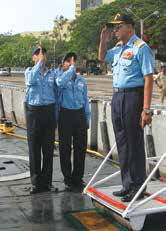
There is no doubt that war today is fought with technology too, so we have introduced B Tech degree at NDA, which was not available earlier. However, that does not detract from the fact that the warrior has to be physically fit; technology can take you so far, but no further. Particularly in the army, he has to be very physically fit. But whichever wing he may choose, we still lay tremendous importance to physical fitness.
No, no, not at all, in fact if you are more than 10% overweight you are warned and advised to reduce. If you don’t, you may not be promoted. Every year we have a medical examination to check your fitness. So, you can’t have a paunch; you have to be physically fit.
More than the people, it is the politician who is indifferent and everything starts from the top. If politicians and governments give due respect to the Armed Forces, that message would travel down. Unfortunately for a variety of reasons, which I will not go into here, the politicians and the bureaucracy have tried to bring down the Armed Forces and that message goes down the line.
Kaumudi Singh: We do feel it when we see the difference, as to how other countries treat their Armed Force officers and how ours does. We used to say that earlier we never had money but we had respect, but now we don’t have that also.
Well, I would say, there is no better service then the Armed Forces, as it gives you adequate remuneration with the best quality of life. Even when we are posted in field stations, our families are well looked after when we are away. To the corporate world I would say, don’t forget the Armed Forces as our youngsters, guarding our borders, ensure peace, security and stability, thus making it possible for the country to prosper and for you to prosper. If there is no peace, security and no stability, the country is subjugated and nobody prospers.
“To the corporate world I would say, don’t forget the armed forces as our youngsters, guarding our terrain, ensure peace and stability, thus making it possible for the country to prosper”
Basically Rajasthan was the first state to promote tourism. This propelled erstwhile royal families in Rajasthan to go in for what is called heritage tourism because we had inherited good properties but could not maintain them with our limited resources. So, this gave us a way to convert our havelis and palaces into hotels and museums, and that sustained the family, and more importantly, it gave employment to a lot of people. It is not just those of us who are working in the hotels who get employment, it is the taxi driver, it is the restaurant man, it is the tour guide, the shopkeeper who prosper. So tourism generates a whole lot of employment opportunities.
Respect for each other and giving space to each other are the key elements in keeping a marriage together forever, says this contented couple...
He is an extrovert, loves to make friends in a jiffy with strangers (read hotel guests) and is a walking encyclopaedia on Jaipur. From being addressed with a ‘Yes Sir’ in his capacity as the then Chief of the Indian Navy, he has cheerfully turned over to now address his guests as ‘Sir’. In sharp contrast with his extrovert nature, his charming and stately wife, Kaumudi Kumari, is an introvert and prefers to keep to herself. However, what is common between them is that together they run Devi Niketan, their family home converted into a dignified and homely heritage hotel in Jaipur, where they lead a post retirement life.
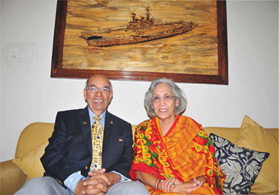
As the First Lady of the Indian Navy, when Admiral (Retd) Madhvendra Singh was the Naval Chief, she has been to several countries along with her husband on official visits. She has been at the helm of the Naval Wives Welfare Association, which does commendable work for the naval fraternity. They neither ‘dated’ nor ‘courted’, those being little known terms then, rarely employed to choose your life partner. No wonder then, that the first time they saw each other was shortly before their engagement. Ever since, they have been together in harmony, for over four decades.
So, what is that binds a marriage together? Says Admiral (Retd) Singh, “No two people can be the same, so the first thing is to respect each other’s differences. That is important in any marriage. Then you must give space, she has to do her own thing, I have to do mine. She doesn’t like outdoor work, so I do not insist that she come with me. If these two aspects are taken care of, then your life together remains cemented even after the initial phase of romance.’’ Adds Kaumudi, “Yes, I also agree with him, but would also like to add that one should not be impatient in a marriage, and should not expect too much out of it. This applies particularly to youngsters, who have to give time for their marriage.’’
What, according to them is the value they instilled in their children while bringing them up? Says Admiral (Retd) Singh, “Basically, as far the children are concerned I am very clear—our first responsibility is to teach them the right values which we cherish, to give them good health by feeding them properly and ensuring they are not undernourished. And of course, the third main responsibility is education, so if you give them good values, education, good health and don’t spoil them too much, they will grow into good and confident individuals. These days, parents spoil their kids with a lot of money.’’ Adds Kaumudi, “I would agree with him and would also like to add that parents should teach by example— they cannot say one thing to the child and then not follow it themselves. Indulging and spoiling children is very prevalent these days. One of the prime reasons being, both parents are working and therefore they have a lot of money, and one way they show their love and affection is by giving them money, which can be counterproductive.”
What is it that she admires most in her husband? “He is a kind man, which he exhibits by giving me space and allowing me to do my thing.’’ And what does he admire about her? Says he, “Actually, she is a lady of great character and she is my best critic—she will never hesitate to point out if I’ve done something wrong-who else will tell me, but my wife. She keeps me on track and, for example, she will not allow me to drink and drive.’’
“No two people can be the same, so the first thing is to respect each other’s differences. That is important in any marriage. Then you must give space, she has to do her own thing, I have to do mine”
What do their children do? Says Kaumudi, “Our son is in the HSBC Bank as a Managing Director and Head of Documentary Trade Product Management. Our daughter has done a PhD in Criminology and Criminal justice. She is now Vice President of Online Education at Columbia College, USA.’’
What is their philosophy of life? States Admiral (Retd) Singh, “Firstly, work hard and play hard, that is my philosophy. Enjoy your work and at the same time enjoy your hobbies—for me it is any outdoor activity. These days my favourite pastime is growing trees. In the past few years I must have planted 3000-4000 trees in the farm outside, and this has attracted so many birds. A plot that had no trees has been turned green. Thirdly, be content and don’t worry.” Adds Kaumudi, “One should also be considerate and compassionate. What is lacking on the roads is that people are not considerate to anybody.’’
Admiral Singh leaves us with a Rajasthani poem about happiness, saying he has them all and is happy and content. The poem is worth noting:
“Pratham sukh nirogi kaya Dujo sukh gahr me thodi si maya Thijo sukh naari chartitra wani Putra putri agyakaari”
Roughly translated, it means, ‘The first source of happiness is good health, The second in a little bit of desire; The third, in a woman of character (not a beautiful woman, not a rich woman) (And) from obedient children.’
By Vinita Deshmukh